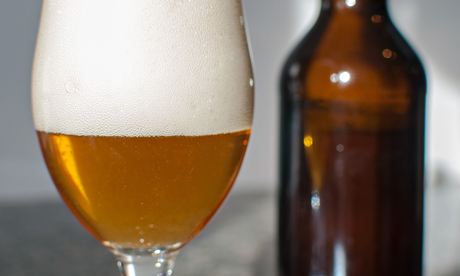
Ask most real ale drinkers, particularly northern ones, what the perfect pint should look like and you will get a clear answer – literally. Said pint should be transparent, sparkling, a crystal-clear beer topped with a tight white head as smooth as virgin snow on a bowling green. I'm getting thirsty just typing that.
Yet drinkers at this weekend's Spring Haze festival (free, 23-26 May) would scoff at such tradition. Held at the Gun pub in Docklands, London, SHF will showcase 30 "natural and unfined beers" from cutting-edge breweries such as Kernel and Brew By Numbers. Far from clear, these beers are opaque on a spectrum from hazy to weak, milky tea. Such is the growth in unfiltered craft beers that this style has been dubbed (mainly by its detractors) as "London murky".
On the continent, none of this would be an issue. Many wheat beers are designed to be served cloudy with yeast – some Belgians even drink the yeast from the bottom of bottled-conditioned beers as a kind of "dessert". The unfiltered, fresh versions of Czech lagers (Budvar's unpasteurised yeast beer is available here too) are considered to be top of the hops.
However, for drinkers who grew up believing that cloudy beer was suspect – badly kept, too warm or the dog-end of the barrel that was going to make you sick – the idea of drinking soupy ale is proving divisive. We drink with our eyes and, for many beer enthusiasts, opaque ale just doesn't look right.
So why is it becoming such a "thing"? Taste, of course. Cask and craft keg beer ferments in the barrel. In one way or another, it is primed with yeast so that it continues to carbonate after dispatch. In order to clear that beer of yeast before serving it, isinglass or finings (chemically prepared fish guts) are added. As the beer settles, the finings bind with the yeast, fall away and the beer "drops bright".
The problem with that, as far as unfined advocates are concerned, is that those finings also bind with proteins and hop oils and suck flavour out of the beer. Not only is "natural" beer vegan-friendly (some claim that drinking the yeast has health benefits, too), it is also more vivid and flavourful.
"Without question, it intensifies aroma and flavour," says Justin Hawke of Moor Beer. "Whether that is to someone's tastes is another question. A traditional ale drinker who drinks delicate beers is going to taste one of those hoppy, unfined IPAs and not be able to cope with the way it looks and tastes. It's alien to them. But you can't argue that it's not more flavourful. Basically, the London brewers are trying to up the flavour threshold. And, from my perspective, it improves the visual appeal. Unfined beer has this beautiful, attractive opacity, as long as you're not brainwashed into thinking that beer has to be clear."
Me? I'm torn. I can't deny the aesthetic appeal of the perfect clear pint. But I also realise that is a rather daft, inherited prejudice. Moreover, this criticism of "London murky" (the argument is that upstart hipster brewers are using the excuse of making raw, natural, big-impact beers as a cover to chuck out haphazard, unbalanced rubbish) seems to spring from a general cynicism about the febrile creativity of the craft beer scene, rather than objective fact. I think you have to judge on a beer-by-beer basis.
The last unfiltered beer I drank, Beavertown's 8-Ball Rye IPA, certainly looked unappetising, like a half-pint of brown soup. However, if you like a lot of complex flavours in your beer, you couldn't fault it. From its background smokiness and spice through its almost fizzily sour mid-range (due to the higher yeast content, presumably?) to its top hop notes of tropical bubblegum, Citra and astringent bitterness, this was a big mouthful. You might find a beer like that too busy. But it was a persuasive argument for unfiltered beer.
Clear, natural beer would be the ultimate goal, which Baseline Brewing's Julian Spender claims he has achieved. The Sussex brewer uses a yeast (he won't say which, but apparently several unfined brewers are on to it) which, if he leaves his beer to settle for an extended period, and pub owners treat his casks right, collects in a tight sediment at the bottom of the barrel without any filtering.
"As a result, my beer is pretty damn clear," he says. "It used to be really hazy and it was a problem. I was pushing mud uphill: the majority of drinkers, before they even sip that pint, hold it up to the light and if it's not crystal clear they think there's something wrong with it. I'm guilty of it as well. I don't like beer that's really cloudy unless I know it's supposed to be, such as a wheat beer."

No comments:
Post a Comment